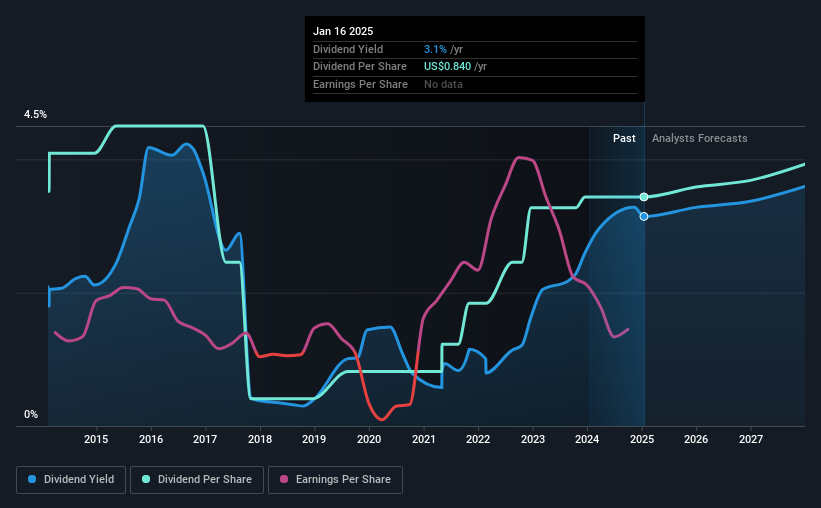- United States
- /
- Chemicals
- /
- NYSE:MOS
Mosaic (NYSE:MOS) Will Pay A Larger Dividend Than Last Year At $0.22
The Mosaic Company (NYSE:MOS) has announced that it will be increasing its periodic dividend on the 20th of March to $0.22, which will be 4.8% higher than last year's comparable payment amount of $0.21. This will take the annual payment to 3.1% of the stock price, which is above what most companies in the industry pay.
View our latest analysis for Mosaic
Mosaic's Projected Earnings Seem Likely To Cover Future Distributions
While it is great to have a strong dividend yield, we should also consider whether the payment is sustainable. Prior to this announcement, Mosaic was paying out 72% of earnings and more than 75% of free cash flows. This indicates that the company is more focused on returning cash to shareholders than growing the business, but we don't think that there are necessarily signs that the dividend might be unsustainable.
Looking forward, earnings per share is forecast to rise by 86.6% over the next year. Assuming the dividend continues along recent trends, we think the payout ratio could be 35% by next year, which is in a pretty sustainable range.

Dividend Volatility
Although the company has a long dividend history, it has been cut at least once in the last 10 years. The dividend has gone from an annual total of $1.00 in 2015 to the most recent total annual payment of $0.84. The dividend has shrunk at around 1.7% a year during that period. Generally, we don't like to see a dividend that has been declining over time as this can degrade shareholders' returns and indicate that the company may be running into problems.
The Dividend Looks Likely To Grow
With a relatively unstable dividend, it's even more important to see if earnings per share is growing. It's encouraging to see that Mosaic has been growing its earnings per share at 31% a year over the past five years. Fast growing earnings are great, but this can rarely be sustained without some reinvestment into the business, which Mosaic hasn't been doing.
In Summary
Overall, we always like to see the dividend being raised, but we don't think Mosaic will make a great income stock. The low payout ratio is a redeeming feature, but generally we are not too happy with the payments Mosaic has been making. This company is not in the top tier of income providing stocks.
Investors generally tend to favour companies with a consistent, stable dividend policy as opposed to those operating an irregular one. At the same time, there are other factors our readers should be conscious of before pouring capital into a stock. As an example, we've identified 2 warning signs for Mosaic that you should be aware of before investing. If you are a dividend investor, you might also want to look at our curated list of high yield dividend stocks.
New: Manage All Your Stock Portfolios in One Place
We've created the ultimate portfolio companion for stock investors, and it's free.
• Connect an unlimited number of Portfolios and see your total in one currency
• Be alerted to new Warning Signs or Risks via email or mobile
• Track the Fair Value of your stocks
Have feedback on this article? Concerned about the content? Get in touch with us directly. Alternatively, email editorial-team (at) simplywallst.com.
This article by Simply Wall St is general in nature. We provide commentary based on historical data and analyst forecasts only using an unbiased methodology and our articles are not intended to be financial advice. It does not constitute a recommendation to buy or sell any stock, and does not take account of your objectives, or your financial situation. We aim to bring you long-term focused analysis driven by fundamental data. Note that our analysis may not factor in the latest price-sensitive company announcements or qualitative material. Simply Wall St has no position in any stocks mentioned.
About NYSE:MOS
Mosaic
Through its subsidiaries, produces and markets concentrated phosphate and potash crop nutrients.
Very undervalued with excellent balance sheet.
Similar Companies
Market Insights
Community Narratives


Recently Updated Narratives

TAV Havalimanlari Holding will fly high with 25.68% revenue growth


Fiducian: Compliance Clouds or Value Opportunity?


Q3 Outlook modestly optimistic
Popular Narratives


MicroVision will explode future revenue by 380.37% with a vision towards success


The company that turned a verb into a global necessity and basically runs the modern internet, digital ads, smartphones, maps, and AI.



